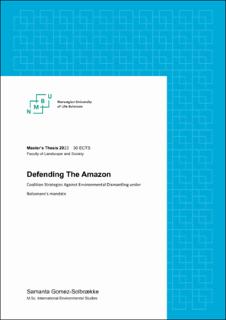| dc.description.abstract | Recognized for its crucial role in global climate regulation, biodiversity, and the livelihoods of numerous communities, the Amazon rainforest faces unprecedented threats from deforestation driven by human activities such as logging, mining, and agriculture. This thesis examines the strategic responses of the Pro-Amazon Coalition to counteract the dismantling of environmental protections under President Jair Bolsonaro’s administration, contrasting with the earlier efforts under President Luiz Inácio Lula da Silva to balance economic growth and environmental conservation.
Addressing the question, ‘What strategies did the Pro-Amazon Coalition employ to resist the dismantling of environmental protections in the Brazilian Amazon under Bolsonaro's presidency?’, this study applies the Advocacy Coalition Framework (ACF). The ACF is particularly suited for analyzing environmental policy issues in the Amazon due to its emphasis on diverse actors and external dynamics. The Pro-Amazon Coalition, comprising indigenous and traditional communities, activists, NGOs, and academics constitute the voice of environmental resistance during a period marked by increased environmental deregulation and high conflict levels.
The findings show that under Bolsonaro's mandate, the Pro-Amazon coalition experienced a complete breakdown in communication with the federal government. This loss of dialogue was unprecedented in the new republic period and represented a clear detachment from environmental concerns. In previous administrations, some level of engagement and negotiation was possible, even amid disagreements. The reasons behind this total lack of cross-coalition coordination and engagement are multifaceted, but largely stem from opposing policy core beliefs. This extreme polarization impeded mediation by policy brokers. To resist this dismantlement, the Pro-Amazon Coalition invested in three main strategic approaches categorized as information, political, and engagement strategies. This thesis also indicates that the levels of intra-coalition coordination vary depending on the actors’ groups, e.g., research institutes tend to be less engaged in concerted actions with other groups within the coalition. | |
